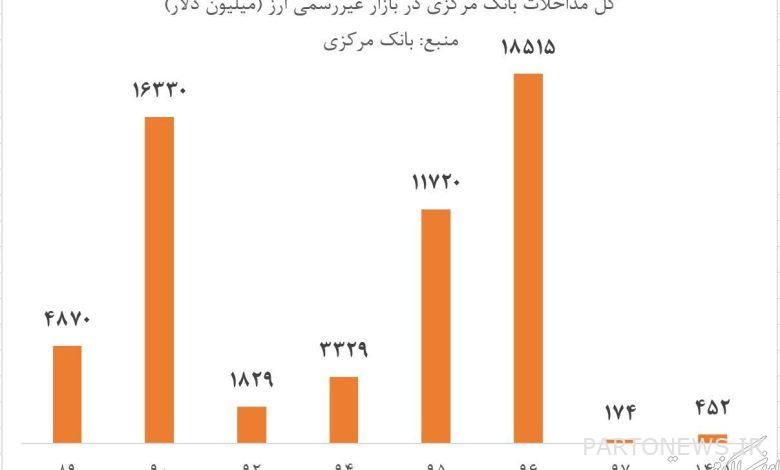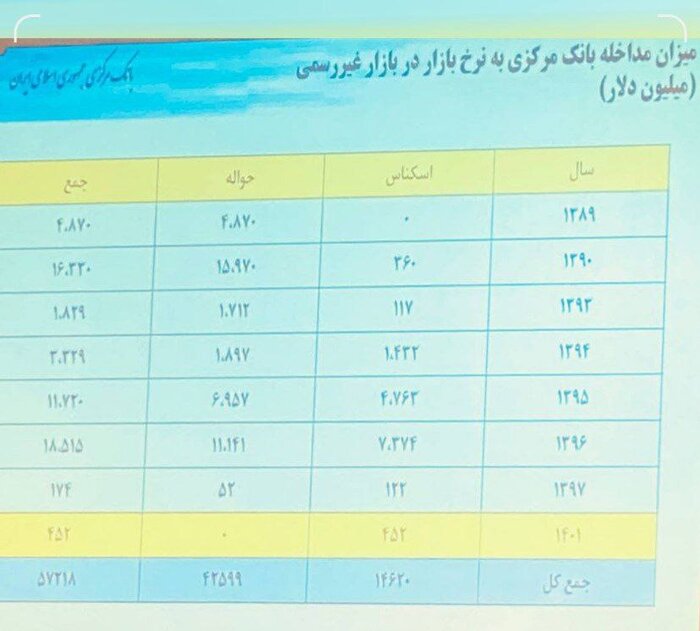More than 30 billion dollars from the country’s foreign exchange reserves were spent on Rouhani’s re-election in 2016

According to Iran EconomistYesterday, during the 30th annual monetary and exchange policy conference, the official statistics of the central bank’s foreign exchange interventions in the foreign exchange market were unveiled for the first time.
In this meeting, Mohammadreza Farzin, the head of the central bank, explained the conditions and problems of the country in the field of foreign exchange and the policies adopted in this field in recent years until now, and presented statistics on the level of intervention of the central bank in the foreign exchange market.

The statistics that Mohammadreza Farzin, the head of the central bank, unveiled this morning at the conference on monetary and foreign exchange policies.
The statistics that were disclosed in the monetary and currency policy conference show that the level of intervention of the central bank in the informal currency market has peaked in two periods; One in 1990 and the other in 1995 and 1996. In 1990, with the beginning of sanctions, the inflammation started in the informal market. Therefore, it is not strange that the Central Bank intervenes in this market to control the rate. But in 1995 and 1996, which was ironically the era of JCPOA and the so-called “removal of sanctions”, the amount of intervention of the Central Bank in the informal market not only peaked, but also broke records.
The sharp growth of the Central Bank’s foreign exchange interventions in the years 2015 and 2016 is a clear evidence of Hassan Rouhani’s electoral abuse of the country’s foreign exchange reserves to artificially suppress the exchange rate and achievement It is false in the name of “preserving the value of the national currency”. The issue that happened exactly in the 2016 elections and Hassan Rouhani, by resorting to the suppressed and artificial exchange rate during the elections, called it the result of the wise management of his government and promised to continue the same process in the second term.
The previous government’s abuse of foreign exchange reserves to suppress the exchange rate God Saif, the head of the central bank in the same years confirmation did Three years ago, in a detailed interview, he disclosed the Central Bank’s reports to the government regarding the reduction of foreign exchange reserves due to extensive interventions in the foreign exchange market and the risk of rate jumps as a result of the exchange rate suppression policy and Rouhani’s negative reaction to these warnings.
Saif stated in this interview: It was in 1995, once in a meeting of the economic headquarters of the government, Mr. President, reviewing the memories of the time of the Supreme National Security Council, said that one of the basic things we did there was that we set a minimum inventory for basic goods. . For example, wheat should not fall below a certain amount. In 2016, I reminded them that you said something like this, is wheat more important now or currency? I recommend that we take a proposal to the Supreme National Security Council with the content that the currency reserves should not be less than a certain number. Ishan (Rouhani) said that now is not the time.
The then head of the central bank stated: In July 2016, the currency went up and we submitted a worrying report to the economic headquarters. In July 2016, because the volume of interventions was increasing, the central bank submitted a special report to the economic headquarters of the government and expressed concern that we cannot continue with this situation. We emphasized there that if you want to go ahead with this process, we will definitely run into problems. It was there that Rouhani said not to say these words at all and to have a meeting with Mr. Jahangiri and see what you can do.
He continued: It passed, until we felt more danger in Shahrivar (year 2016). Our resources (the foreign exchange reserves of the central bank) were under pressure, price control had become very difficult, and the amount of intervention by the central bank was increasing. (During the government meeting in September on the issue of currency management) Mr. Dr. Jahangiri started speaking and when Mr. President realized what the issue was, his face became confused. At this moment, Mr. Dr. Jahangiri assigned me to continue the discussion. I continued and spoke. Mr. Rouhani got angry and said aggressively, what are these words? Have you gathered to say these words? That it was not possible to have a country. Collect these words. Then addressing Mr. Jahangiri, he said to hold a meeting, this story should be resolved in any possible way. Of course, one or two people talked. Mr. Neely also said some points that met with harshness.
Saif also answered the question, “Was Mr. Rouhani worried about the political consequences of the exchange rate increase?” He said: Yes. Of course, it was the same view in the parliament.
These statements of the head of the central bank at the time show that Hassan Rouhani and his political concerns were behind the central bank’s extensive currency manipulations in the previous government, especially in the years leading up to the 1996 elections. As a result of these currency attacks, tens of billions of dollars from the country’s foreign exchange reserves were spent instead of being used for the development of the country and the development of economic infrastructure. Vote Avari became a cleric.

